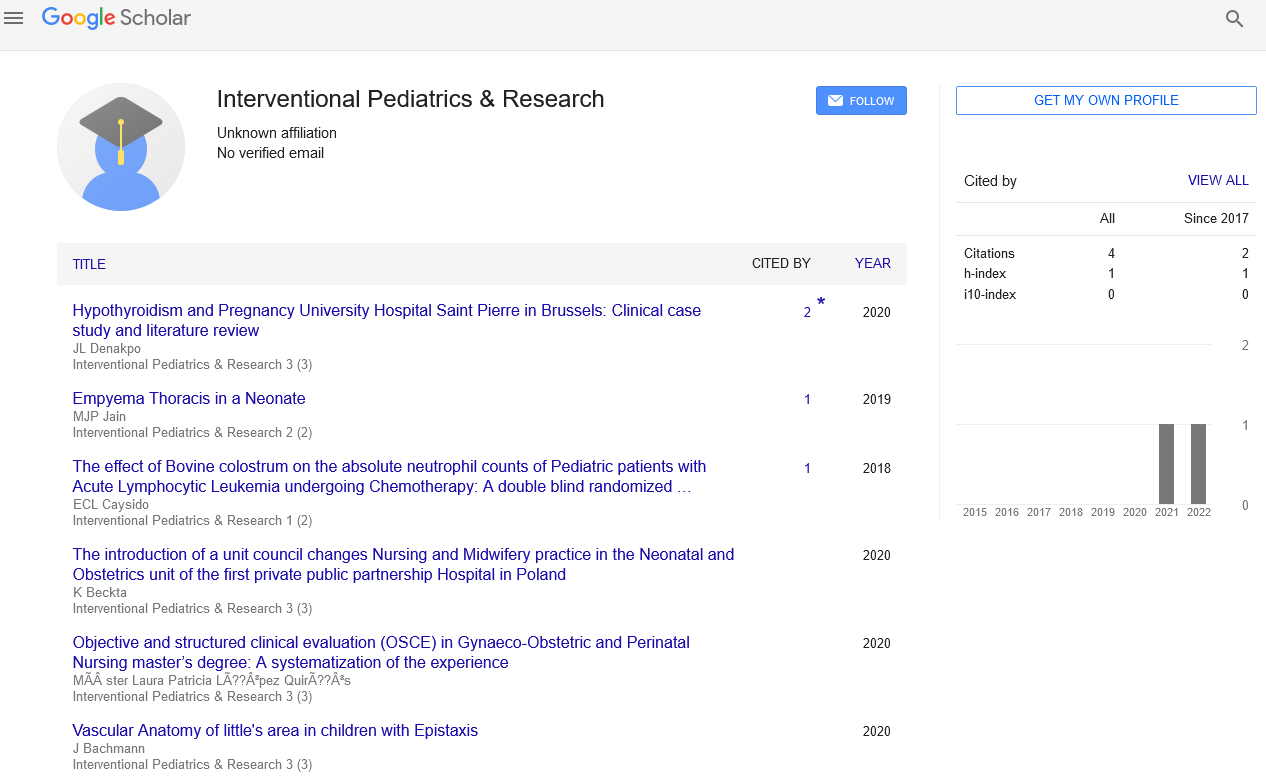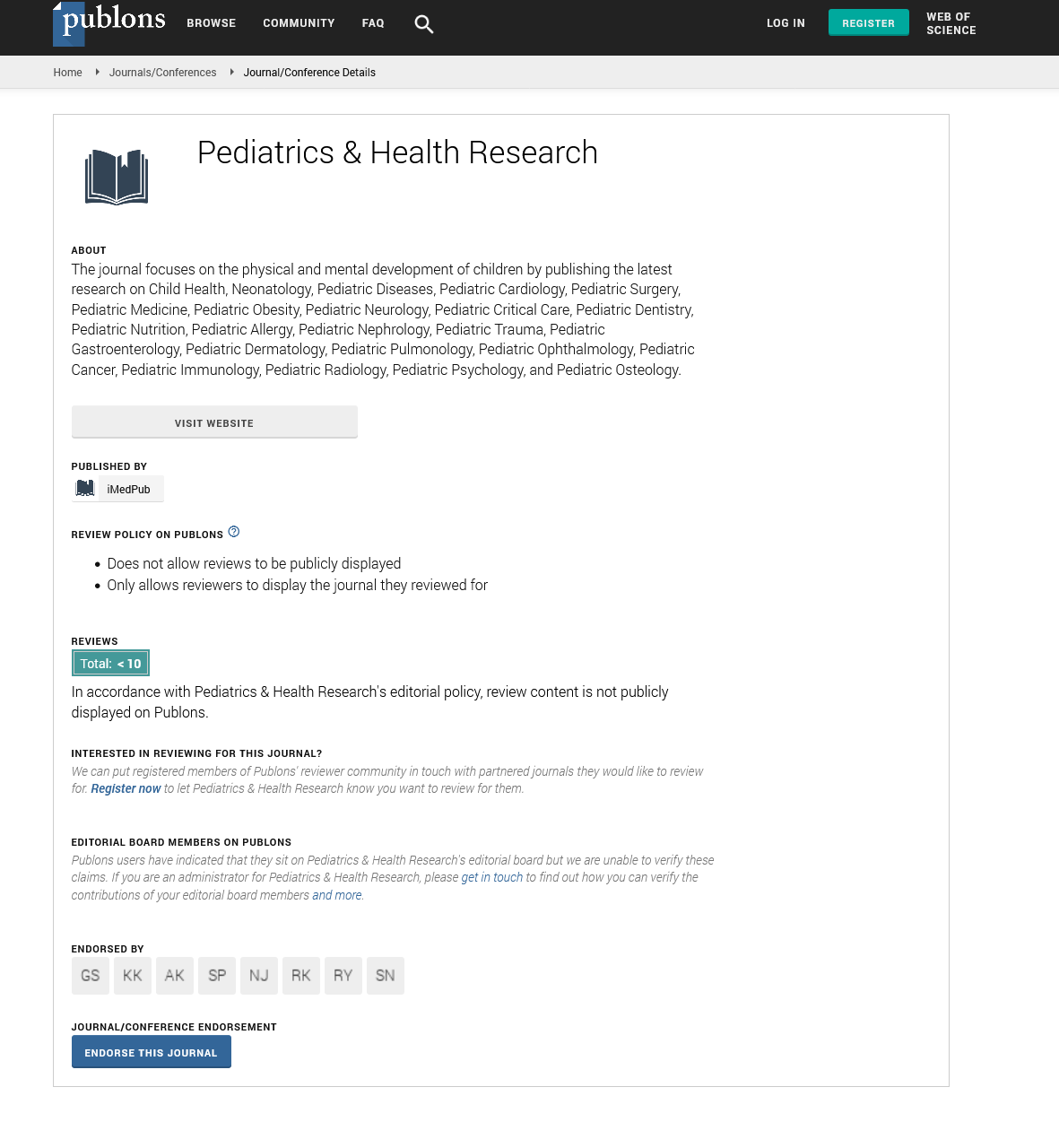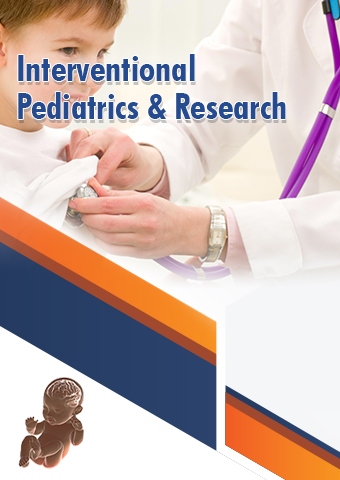Review Article - Interventional Pediatrics & Research (2023) Volume 6, Issue 2
Pediatric Pharmacology: Understanding Medications for Children
Jack Smith*
Department of Pediatric Pharmacology, USA
Department of Pediatric Pharmacology, USA
E-mail: smith_jac8@gmail.com
Received: 01-April-2023, Manuscript No. ipdr-23-96554; Editor assigned: 03-April-2023, Pre-QC No. ipdr-23- 96554 (PQ); Reviewed: 18-April-2023, QC No. ipdr-23-96554; Revised: 24-April-2023, Manuscript No. ipdr-23-96554 (R); Published: 28-April-2023, DOI: 10.37532/ ipdr.2023.6(2).31-33
Abstract
Pediatric pharmacology is a specialized field that deals with the study of medications for children. Children are not small adults, and they require different dosages and formulations of medications to ensure safe and effective treatment. Pediatric pharmacology involves understanding how medications work in children, considering their unique body composition, organ function, and metabolic rates. The field involves the development and testing of medications specifically for use in children and the use of specialized medications to treat specific conditions that affect children. Clinical trials in children are crucial for establishing the safety and efficacy of medications in pediatric populations. This article provides an overview of pediatric pharmacology and emphasizes the importance of understanding medications for children to ensure their health and well-being.
Keywords
Pediatric pharmacology • Medications • Children • Dosages • Formulations • Pharmacokinetics • Clinical trials • Specialized medications • Specific conditions
Introduction
Pediatric pharmacology is the study of how medications are used in children. Children are not just small adults and may require specialized dosages and formulations of medications to ensure safe and effective treatment. It is essential to understand how medications work in children to avoid under or over-dosing, adverse drug reactions, and other medication-related problems. Pediatric pharmacology involves the study of how medications are absorbed, distributed, metabolized, and excreted in children. The pharmacokinetics of medications in children may be different from adults due to differences in body composition, organ function, and metabolic rates. Therefore, it is crucial to consider these factors when prescribing medications to children. Children are also at higher risk of medication-related problems due to the limited number of medications approved for use in pediatric populations. Often, medications used in adults are used off-label in children, which may increase the risk of adverse drug reactions. Additionally, many medications used in adults are not suitable for use in children due to their adverse effects on growth and development. Pediatric pharmacology involves the development and testing of medications specifically for use in children. Clinical trials in children are essential to establish the safety and efficacy of medications in pediatric populations. However, ethical concerns and difficulties in recruiting pediatric patients for clinical trials can make it challenging to obtain adequate data. Medications used in Pediatrics are typically formulated differently from those used in adults. Dosages are adjusted based on weight, age, and other factors unique to the pediatric patient. Liquid formulations are commonly used for younger children, as they may have difficulty swallowing pills or tablets. Pediatric pharmacology also involves the use of medications in specific conditions and diseases that affect children. Some examples include asthma, diabetes, ADHD, and cancer. Specialized medications may be required to treat these conditions in children effectively. In conclusion, pediatric pharmacology is a vital field of study that focuses on the safe and effective use of medications in children. Understanding how medications work in children is critical to ensure proper dosing and avoid medication-related problems. Clinical trials and the development of medications specifically for use in pediatric populations are essential to improving the health and well-being of children. If you have concerns about medications for your child, it is essential to speak with your child’s pediatrician or a pediatric pharmacist to ensure they receive safe and effective treatment.
Understanding Medications in Children
Medications play a critical role in the treatment of many childhood illnesses and conditions. However, children are not just small adults, and medications must be carefully selected, dosed, and administered to ensure their safety and efficacy. Understanding how medications work in children is essential to ensure proper dosing and avoid medication-related problems. Children’s bodies are different from adults in many ways, including organ function, metabolic rate, and body composition. These differences can affect the absorption, distribution, metabolism, and excretion of medications in children. Pediatric dosages are typically based on a child’s weight, age, and other factors that may affect medication response. Medications may also be formulated differently for children, with liquid formulations commonly used for younger children who may have difficulty swallowing pills or tablets. The route of medication administration may also be different for children, with oral medications, inhalers, suppositories, and injections commonly used. It is essential to understand the appropriate administration route for each medication to ensure maximum efficacy and avoid adverse drug reactions. Additionally, certain medications may have adverse effects on children’s growth and development, and pediatric formulations may be required to minimize these risks. For example, antibiotics can cause tooth discoloration in developing teeth, and some asthma medications may affect bone growth. In conclusion, understanding medications in children is crucial to ensure their safety and efficacy in treating childhood illnesses and conditions. Dosages and formulations must be carefully selected based on a child’s weight, age, and other factors unique to the pediatric patient. It is also essential to consider the route of administration and any potential adverse effects on growth and development. By understanding these factors, healthcare providers can ensure that children receive safe and effective medication treatment.
Medication-Related Problems in Children
Medications are an essential part of treating illnesses and conditions in children. However, children are at a higher risk of medicationrelated problems due to their unique physiology, metabolism, and developmental stage. Medication-related problems can cause adverse reactions, drug interactions, and other complications that may harm the child. Therefore, it is crucial to understand the causes and prevention of medication-related problems in children. Medication-related problems in children may arise due to a variety of reasons, including incorrect dosages, medication errors, drug interactions, and off-label use. Children are more likely to experience medication errors, such as incorrect dosages or administration, due to their weight-based dosing and age. Medication errors can occur during prescription, dispensing, or administration of the medication. Drug interactions are another common cause of medication-related problems in children. Children with multiple medical conditions may be taking several medications, increasing the risk of drug interactions. Drug interactions can cause adverse reactions, such as nausea, vomiting, dizziness, or even life-threatening events. Offlabel use of medications is also a concern in children, as many medications are not approved for use in pediatric populations. This increases the risk of adverse reactions, as the safety and efficacy of the medication have not been adequately established in children. In conclusion, medication-related problems in children can cause adverse reactions and complications that may harm the child. Understanding the causes and prevention of medication-related problems is crucial to ensure the safe and effective use of medications in children. Collaboration between healthcare providers, caregivers, and parents is essential to prevent medication-related problems in children. The use of technology can also help reduce medication errors and improve medication safety in pediatric populations.
Conclusion
Pediatric pharmacology is a specialized field that requires a comprehensive understanding of how medications work in children. Children have unique physiological and metabolic characteristics, and as such, require different dosages and formulations of medications to ensure safe and effective treatment. Medicationrelated problems are a common concern in children due to their increased susceptibility to errors, drug interactions, and off-label use. To prevent medication-related problems, healthcare providers, caregivers, and parents must collaborate and follow best practices in medication administration. Additionally, the development and testing of medications specifically for children and the use of specialized medications to treat specific conditions in children are crucial. Clinical trials in pediatric populations are necessary to establish the safety and efficacy of medications for children. Overall, the field of pediatric pharmacology is essential to ensure the health and well-being of children and requires on-going research and education to improve the understanding and practice of medication management in pediatric populations.
References
- Ware SM, Quinn ME, Ballard E et al. Pediatric restrictive cardiomyopathy associated with a mutation in beta-myosin heavy chain. Clin Genet.73, 165–710 (2008).
- Malhotra P, Gill RK, Saksena S et al. Disturbances in cholesterol homeostasis and non-alcoholic fatty liver diseases. Front Med.7, 467 (2020).
- Moller DV, Andersen PS, Hedley P et al. The role of sarcomere gene mutations in patients with idiopathic dilated cardiomyopathy. Eur J Hum Genet. 17, 1241–1249 (2009).
- Mazzotti A, Caletti MT, Sasdelli AS et al. Pathophysiology of non-alcoholic fatty liver disease. Lifestyle gut gene interaction. Dig Dis. 34(1), 3–10 (2016).
- Kaski JP, Syrris P, Burch M et al. Idiopathic restrictive cardiomyopathy in children is caused by mutations in cardiac sarcomere protein genes. Heart. 94, 1478–1484 (2008).
- Kotronen A, Westerbacka J, Bergholm R et al. Liver fat in the metabolic syndrome. J Clin Endocrinol Metab. 92, 3490–3497 (2007).
- Mogensen J, Kubo T, Duque M et al. Idiopathic restrictive cardiomyopathy is part of the clinical expression of cardiac troponin I mutations. J Clin Invest. 111, 209–216 (2003).
- Kwanten WJ. Role of autophagy in the pathophysiology of non-alcoholic fatty liver disease: a controversial issue. World J Gastroenterol. 20, 7325 (2014).
- Xing Y, Ichida F, Matsuoka T et al. Genetic analysis in patients with left ventricular no compaction and evidence for genetic heterogeneity. Mol Genet Metab. 88, 71–77 (2006).
- Faraji Hormozi S, Saeedi AA, Aminianfar M et al. Studying the Frequency of Nosocomial Infection and its Relative Factors in the Intensive Care Unit of Hospitals Based Upon NNI System. Eurasian J Anal Chem. 13, (2018).
Index at, Google Scholar, Crossref
Indexed at, Google Scholar, Crossref
Indexed at, Google Scholar, Crossref
Indexed at, Google Scholar, Crossref
Indexed at, Google Scholar, Crossref
Indexed at, Google Scholar, Crossref
Indexed at, Google Scholar, Crossref
Indexed at, Google Scholar, Crossref
Indexed at, Google Scholar, Crossref


